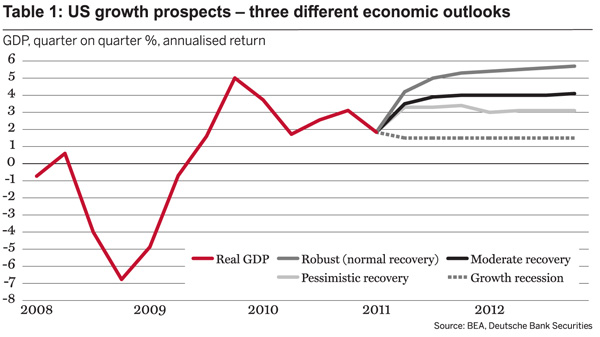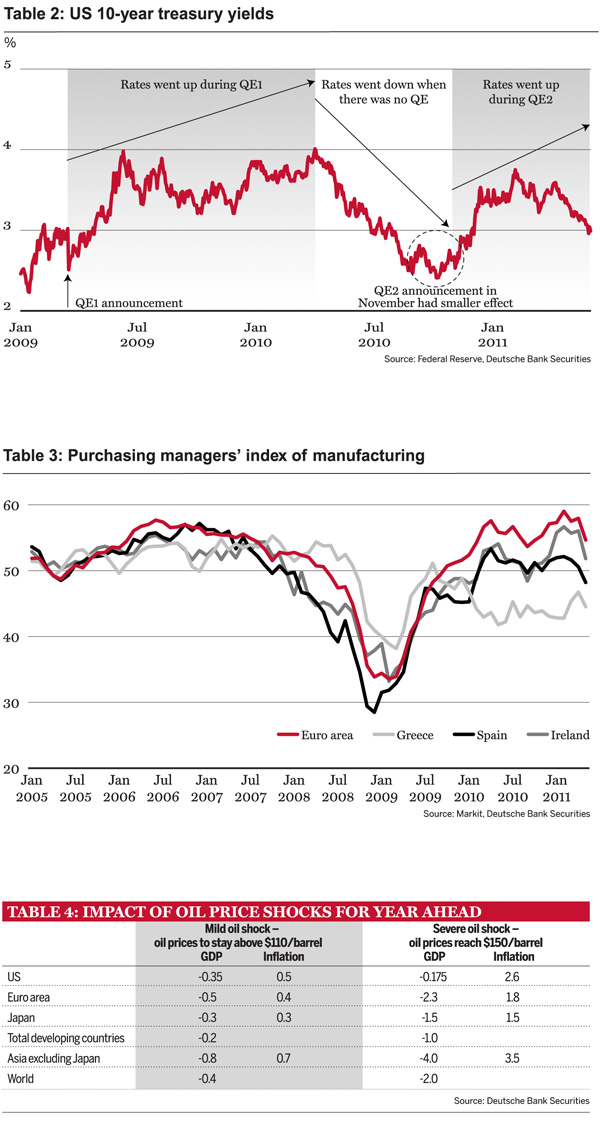Macro-economic outlook remains bright
Torsten Slok, Deutsche Bank’s chief international economist, provides an appraisal of the current global macro-economic picture and looks at potential causes for concern.
Despite a less than ideal first half of the year in some regions – namely Japan and the European periphery – the overall macro picture remains positive. Indeed, looking at each region individually we see some causes for concern, but overall the picture points to positive medium- and long-term outcomes.
North America
Economic debate in the US is currently being dominated by discussion surrounding the raising of the public debt ceiling. While this is a relatively routine measure, the highly politicised environment in which the current decision is taking place is contributing to an unusually vocal debate around this issue. Nevertheless, it is almost inevitable that the decision to increase the debt limit will be made over in the third quarter of 2011.
While the fundamentals of the US economy have certainly improved in recent years, there are still several issues worth noting. First, the full consequences of the end of stimulus measures have yet to be felt. There is certainly a danger that removing impetus from the economy in this way will have an effect on the recovery, at least in the short term. Second, weaker economic data from manufacturing, especially the auto industry, gives some cause for concern. While supply chain difficulties in Japan resulting from the recent earthquake and tsunami will certainly be contributing to this picture, it is still too early to tell whether there is also a broader underlying issue. And third, data from the housing market still fails to show any signs of substantive recovery.
However, despite these potential issues, we are still optimistic. Corporate capital expenditure continues to drive organic growth, and while the return to growth has perhaps not been as robust as expected (see Table 1), we are certainly on course to maintain moderate recovery.
Looking forward, the upcoming end of 'Quantitative Easing 2' (QE2) may herald some interesting changes. Following the effect at the end of QE1 (see Table 2), we may see a change in treasury yields, though this will depend on the underlying strength of the economy when QE2 ends. That said, if the Federal Reserve continues to hold these bonds for some time, the 'real' end of QE2 may actually be some time away. Regardless, inflation expectations have certainly risen throughout the QE2 period – possibly a sign of increased market confidence that these actions are going to have the required effect in terms of stimulating the domestic market. In this respect, the Fed will likely argue that its actions have been successful.
Europe and Japan
The key issue here, of course, remains the fate of those European economies currently struggling with debt crises. However, while the situation is certainly concerning, we are confident that the problems these countries are facing will be solved in due course. The International Monetary Fund has put in place suitably tough measures, and while adjustments in these economies will take some time, there is good reason to believe that normalcy will be resumed once these have taken effect.
Indeed, the relative strength in the EU’s core economies such as Germany may well be providing a boost to some peripherals – as shown by the recent uptrend in the purchasing managers’ index (see Table 3) – and we expect these markets to emerge from their adjustment programmes stronger and more efficient.
Looking at Japan, the earthquake and tsunami this year had a devastating effect on manufacturing and we are likely to see several more quarters without positive growth. While a 'V-shaped' recovery is usually the norm in these situations – as was seen in the wake of the Kobe earthquake – Japanese fiscal balances were significantly better in 1995. So, while a strong recovery is still likely, this will have to be conducted with less government support than has been the case after similar natural disasters.
Emerging markets
Many emerging markets, especially in Asia and Latin America, were less affected by the financial crisis than their more developed counterparts and are currently benefiting from further inflows as some investors wait for greater certainty within the eurozone. Given that many of these economies have already undergone significant restructuring, we expect the positive picture to persist and the most significant emerging market economies to continue performing well.
Of course, inflationary pressures and the danger of overheating are the potential hazards presented by such success and some central banks will certainly be considering interest rate raises in order to counter this threat. They will need to be careful in this respect, however, as such measures always present the danger that they will actually draw in greater investment, undermining the original counter-inflationary objectives of the policy.
Looking closer to home, the emerging economies of central and eastern Europe certainly faired worse during the crisis than many of their non-European counterparts, but are now deriving significant benefits from a strong Germany.
Oil and the overall outlook
A final issue worth consideration is the potential impact of further rises in the price of oil. If prices remain high, or even continue to climb, all areas of the global economy are likely to be adversely affected (see Table 4).
Despite the potential cloud on the horizon, the overall global outlook is a positive one. While market participants should certainly keep a close eye on oil prices and the sustainability of the US resurgence – especially given the ongoing state of the housing market – at Deutsche Bank we still expect recovery to continue relatively unperturbed in most regions.
Disclaimer: This article does not constitute an offer, a solicitation of an offer, advice or a recommendation to buy or sell any security or financial instrument. All investments involve risk, including the loss of principal. Investors are encouraged to consult with their investment, tax, legal, accounting and other advisors in connection with any investment.




